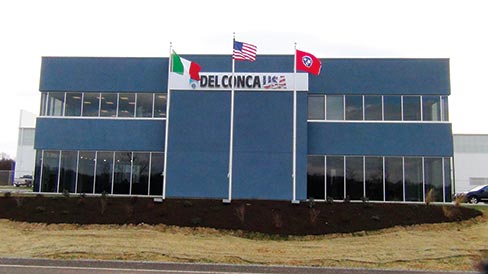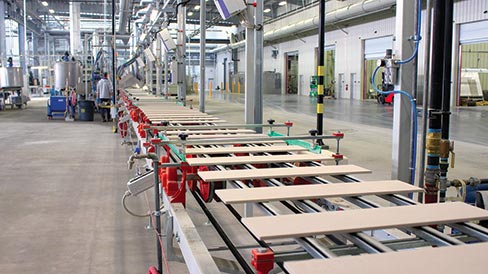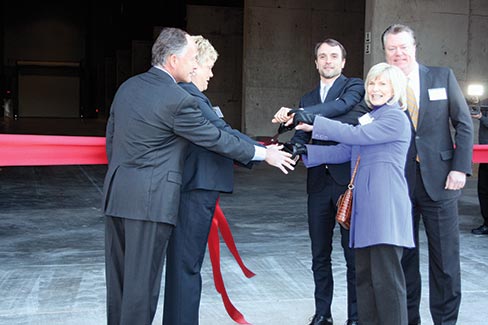Del Conca USA Brings Italian Tile Technology to Rural East Tennessee
Joel Davis
Special Contributor
Photos: Joel Davis and courtesy of Del Conca USA
 Del Conca USA, a ceramic tile manufacturer, has brought the latest Italian tile production technology to rural East Tennessee and the United States.
Del Conca USA, a ceramic tile manufacturer, has brought the latest Italian tile production technology to rural East Tennessee and the United States.
 The company celebrated the opening of its new $50-million facility in the Sugarlimb Industrial Park in the city of Loudon on March 26 — exactly one year after breaking ground on the site.
The company celebrated the opening of its new $50-million facility in the Sugarlimb Industrial Park in the city of Loudon on March 26 — exactly one year after breaking ground on the site.
 “This has been a challenge,” said Paolo Mularoni, president of Del Conca USA. “It has been a very tough and intense year, but we are very happy and proud of the result. Not just because it was done quickly but because we feel that the moment is right for this market of porcelain tile that is expanding in the U.S.”
“This has been a challenge,” said Paolo Mularoni, president of Del Conca USA. “It has been a very tough and intense year, but we are very happy and proud of the result. Not just because it was done quickly but because we feel that the moment is right for this market of porcelain tile that is expanding in the U.S.”
 Operations at the 323,000 square foot facility began early this year. Plans call for factory production to be ramped up to around the clock. Currently two presses are in operation while plans call for more capacity to be added in Phase Two. The company forecasts the production of 30 million sq. ft. of tile per year in Phase One.
Operations at the 323,000 square foot facility began early this year. Plans call for factory production to be ramped up to around the clock. Currently two presses are in operation while plans call for more capacity to be added in Phase Two. The company forecasts the production of 30 million sq. ft. of tile per year in Phase One.
“Having a domestic product allows us to increase our market penetration, the ability to be more cost-competitive, and to be able to respond in a quicker and more flexible way to the needs of the many U.S. customers we are fortunate to already have,” Mularoni said in a press release marking the start of production at the plant.
“This plant is really state-of-the art,” he said. “We’ve used the best available technology in the industry, which is all-Italian machinery, Italian technology, and Italian know-how.”
The manufacturing of ceramic tile at the facility begins with stockpiles of the main ingredients: sand, clay, and feldspar, which is sourced locally and from North Carolina.
The raw materials are crushed to compose a slurry, which is delivered through a pipe system to the spray dryer, and then to the pressing room where the complex automated production system begins.
The largest format of tile currently produced at the plant is 60 cm x 60 cm. During the stamping process, up to five designs or textures are applied during a single run in order to create a more natural, varied look.
Stamping and decoration are digitally controlled. Designs are developed in-house where Del Conca artisans research and create new patterns.
Tiles are glazed and then fired in a 156-yard-long kiln, where they undergo 6 to 8 percent shrinkage.
The final printing is done with automated technology similar to ink jet printers, which is performed in a clean room alongside the production line.
The machinery used in the Loudon plant is even more advanced and energy efficient than those used in the Del Conca Group’s Italian plants. The tiles are inspected by computer and manually, before and after printing, to examine them for flaws and minute imperfections.
“It is essential that our made in the USA production has the same high levels of quality and style as offered in our products made in Italy,” Mularoni said.
After firing, automated systems sort and pack the tiles: logging and tracking the pattern, size, and other parameters. The contents are printed on the boxes.
It is the computer-controlled automation that sets Del Conca apart from other ceramic porcelain tile producers. “Using the most advanced means of production — 100 percent digital decoration and quality control — is the difference,” said Juan Molina, Sales Manager.
The Del Conca USA facility recycles most of the waste produced during manufacturing. Broken or imperfect tiles are returned to the production system, which produces very little actual waste. It is rated as a green factory.
The company is a subsidiary of the Del Conca Group, one of the main Italian ceramic tile manufacturers, comprising four production companies: Ceramica Faetano Spa, Ceramica del Conca Spa, Pastorelli Spa, and Del Conca USA, Inc. It also includes one trading company, Produco, and Fondazione Cino Mularoni, a foundation dealing with cultural and social activities.
Construction of the buildings and the installation of exclusively Italian-made production machinery were completed at the beginning of February just 10 months after the start of construction. After extensive testing of the machinery and training, new employees at the Loudon facility traveled to Italy for hands-on training at other plants in the group.
Loudon provides strategic advantages for the company. “It is very geographically centrally located both in regards to our raw materials, within a range of 300 miles, and for logistics,” Mularoni said. “We are located close to the highway. We are close to a large part of the population of the U.S. We strong believe we have built a plan that will allow us to produce the highest quality porcelain tiles, producing them efficiently, and producing them respecting the environment.”
The global revenue of the Del Conca Group is $165 million, one-third coming from the US. market where sales increased by 12 percent in 2013 compared to the previous year.
Enzo Mularoni, president of Del Conca Group, said the business environment in Tennessee stands in stark contrast to that of Italy.
“This is a new experience for us. In Italy, we have to fight every single day against bureaucracy. Everybody says ‘We want business,’ but in fact it is very difficult.”
Allen Borden, Assistant Commissioner of Business Development for the State of Tennessee’s Department of Economic and Community Development, presented company officials with a Tennessee state flag that had flown over the capitol. Borden said the state expects great things from the facility.
“We make things here in Tennessee, and we manufacture things with a great deal of pride and a great deal of quality. We make cars, we make guitars, and we’ve been known to make a little whiskey that is known around the world. All top quality premium products, and we know you’re going to be making some of the finest ceramic porcelain tile in the world.”
Within five years, the plant is expected to employ 170 people with a projected payroll of nearly $6 million.
The presence of Del Conca USA and the growing ceramic tile market could mean more good news for domestic feldspar producers.
About 30 percent of feldspar production is used for manufacturing ceramics, especially commodes and sinks. Italy currently produces twice the amount of feldspar than the U.S. In Italy, the majority of feldspar production is for ceramic tile where the European custom of using ceramic tile flooring in homes instead of carpeting helps drive the market.
Increasing usage of ceramic tile flooring in the U.S would, in turn, increase the demand for domestic feldspar.
Founded in 1979, the Italian ceramic tile maker uses high-tech manufacturing processes to serve the growing tile market. Its porcelain ceramic tiles are exported worldwide for use in both residential and commercial facilities.
Along with establishing a base for U.S. operations, the Loudon facility will allow Del Conca to better serve U.S. customers, including Lowe’s Arizona Tile, Mannington, Tile Shop and Acme Brick Tile & Stone.
“It’s a great moment of celebration, of happiness, of joy, of being here and seeing this plant open,” Paolo Mularoni said. “Of course, we know it’s just the end of the construction process and now new challenges will arise.”